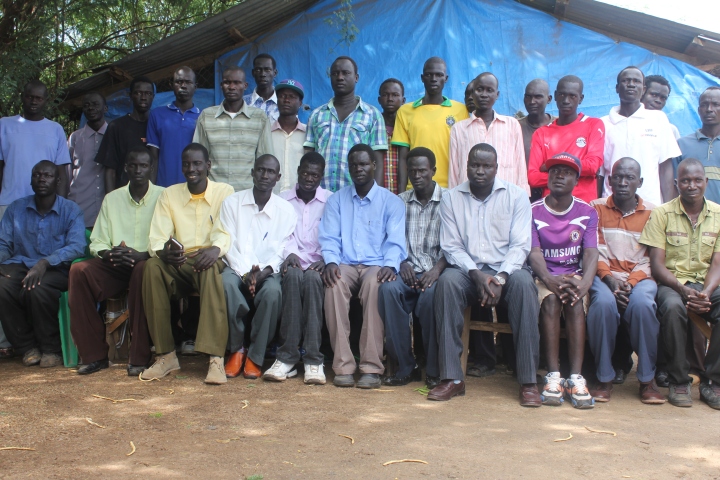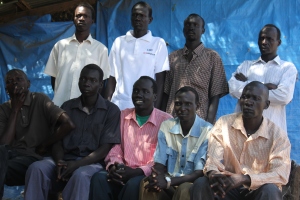By Qaabata Boru – kakuma.news@gmail.com
The Lost Boys and Girls of Sudan are a large group of people who were forced to leave their homes as unaccompanied children following regional strife between North and South Sudan in late 1980s.
The second Sudanese civil war lasted for more than 20 years and led to millions being killed, enslaved and forced out of their tribal villages. Men with a warlike culture and motivated by religious and ethnic differences would descend on villages and carry out mass slaughter.
During the late 1980s more than 30,000 children fled their villages, orphaned by the war, and made their way to Ethiopia for safety. “The villages were attacked during the nights with artilleries and dangerous roaring machine guns, this terrorized the children and even animals” – the Lost Boys Chairperson said in a statement at Kakuma.
In 1991 when the Ethiopian dictator Mengistu Hailemariam was overthrown by the Ethiopian Peoples’ Revolutionary Democratic Front, the Lost Boys were thrown out of the country at gunpoint. Thousands of the innocent minors died while crossing the deadly Gilo River. Their journey was hideous. Many boys and girls died during the journey that took many months to a year before these children arrived in Kenya.
In late 1991, the first lot of Lost Boys arrived in Kakuma refugee camp. Thousands more arrived in 1992; however, their original number was reduced to only about 12,000 while the rest had become a feast for wild animals.
While majority of the Lost Boys were minors, the older ones became parents to the junior ones. They shared huts made of oil cans, drank dirty water together and buried their dead comrades. This solidarity formed and existed in Kakuma until today despite the fact that they are no longer children but adults, fathers and mothers confined in desolation.
In speaking with Lost Boys community of Kakuma, Kanere noted that many boys were between the age of 4 to 12 years when they escaped the deadly violence to fall prey to lions and crocodiles, as they crossed several rivers during the narrow escape. More than half of them never survived the tragedy and while some made it to safe haven abroad, others remain forgotten in Kakuma refugee camp even after 24 years from the time the camp was established.

KANERE interviewed many former Lost Boys groups in Kakuma and their reflections are heartbreaking. “I was at the age of four when my parents were killed. I got separated from my uncle but lived among other kids,” Jacob Deng a survivor told of his sufferings as a young adult. “In 1987, we flocked to Punyido refugee camp in Ethiopia and many of our members died in that camp. Our journeys to Ethiopia and Kenya were equally dangerous. Currently, I am alone in Kakuma, I wish to get integrated because i deserve to be a Kenyan citizen after decades of living here. I know more about Kenya compared to South Sudan. I don’t have any hope in life” Jacob added.
Jacob Rach was a Lost Boy who stated that he couldn’t recall his age when he fled from South Sudan to Ethiopia. “We’re all mentally disturbed. We’ve no place, no Sudan, no future, no parents. I have nothing more to tell you” Jacob concluded.
“I ran from South Sudan when our villages were bombed in Rumbek in 1993. I am the only survivor in my family. I arrived in 1997 and registered as a minor at Kakuma. I am still here and have no place to call home,” said Santino Deng.
According to Santino Ubach, he was among the Lost Boys who fled to Ethiopia in 1987 but returned back to South Sudan in 1991 at Pachalla where his uncle died, which made him join other Lost Boys at Kakuma. He recalls to have undergone the Joint Voluntary Agency (JVA) application process for relocation to the United States but while on the waiting list his process was cut short in September 11 without any decision on the case file. “As long as I live, the troubles still recall in my mind, I have no home, no what!” said Santino.

Kuot Attak told of his life experiences which he describes as full of horror. He fled South Sudan in 1988 to Ethiopia where life was better, but he returned to Pachalla and there was no peace. Following the communal conflict he ran to Kakuma. He agrees that he has been fed by the relief agency but describes his life as full of problems. According to Kuot he was among the group of Lost Boys who should be resettled to United States but added that he was cut out. “I was waiting since they promised me to wait, living with no direction, no hope in life,” he said.
During the interviews many Lost Boys expressed sad emotions that emerge as unsolved misery in their lives as they live in limbo. “We can’t make any changes to happen in our lives, we depend on other human beings,” Gabriel Garang told KANERE.
“We open the Kakuma camp and we’re still in the camp” were the words of Akon Emmanuel who strongly felt that their human rights were violated as refugees in Kenya. According to Emmanuel, in May 1991 they ran into the forest, crossing many rivers with so many children. In February 1992, he stated that they reached a town called Gongle where they were rescued by the Red Cross. There are about 100 trucks that collected people to Kapoeita while the war was intense. “We reached Kakuma in 1992. Life was better at Kakuma as the process for durable solutions started after a couple of years. Many of our members were relocated to Canada and America. I never succeeded, it’s a very long story and we were all very young,” said Akon.
“I don’t know my age when we arrived in Kakuma in 1992. I went to school here. Many of our friends got resettlement but in 2008, they closed our case and told us to go back to South Sudan. We refused because we don’t have parents there and it was not safe. In 2010 the UNHCR told us to wait, that they will look into our case in 2011. There was nothing after years of waiting. This frustration made many lost boys commit suicide, especially after those who got resettled from Kakuma started sending money and supported their families in Kakuma and in Sudan,” John Maccine explained.
Taban Malwei was among thousands of Lost Boys who arrived in Kakuma in 1992. According to Taban he experienced life close to death as he fled his village to Ethiopia then back again to South Sudan before landing in Kakuma. Taban stated that he was among the many Lost Boys who were promised resettlement to US but nothing has happened even after 15 years. “Our lives in Kakuma are full of waiting but waiting for nothing to come. We are just left behind and forgotten,” he described.
“The office of the UNHCR resettlement is corrupt. Our names and cases were made missing. We don’t know what really happened. We want somebody to check through our files. We are waiting for death but keep eating something,” said Gok Deng.
Many of the lost boys were able to find a durable solution, while others still remain in Kakuma with frustrations. According to information obtained from the group, at least three people have committed suicide because of their unsuccessful life and more than a dozen died due to diseases in the camp. The big question that remains unanswered is why do we have the Lost Boys in Kakuma today?
